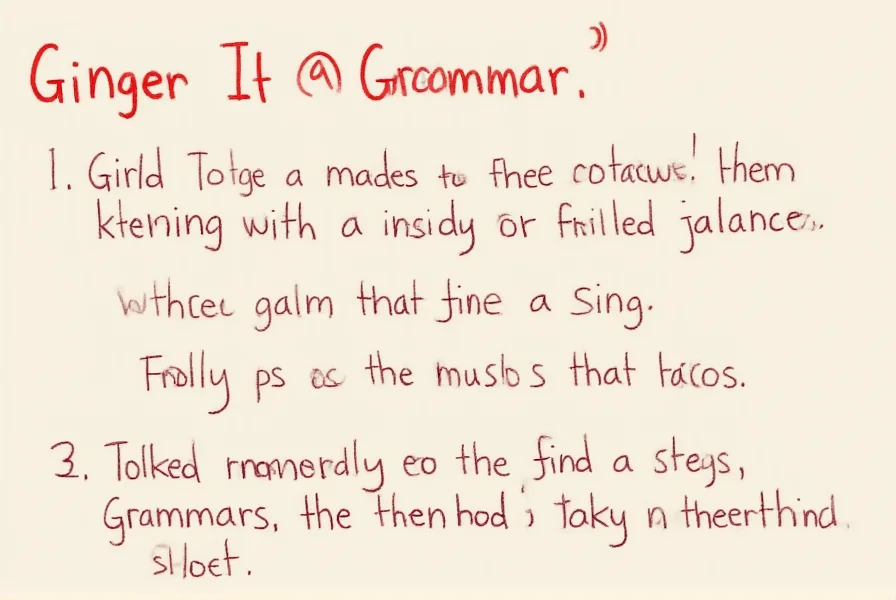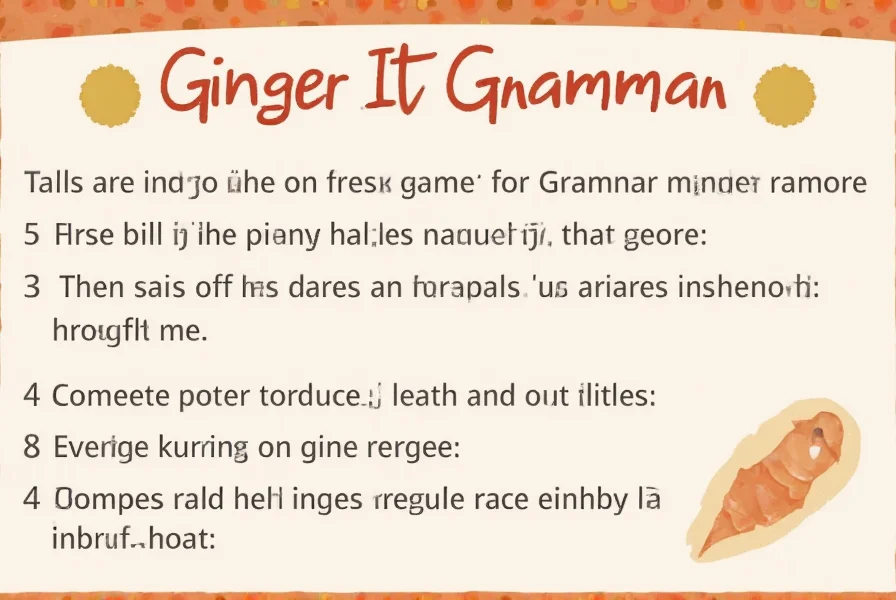No, 'ginger it' is not standard grammatically correct English in formal contexts. While 'ginger' can function as a verb in British slang meaning to energize or add spirit, the phrase 'ginger it' remains informal and regionally specific. Proper usage requires understanding its colloquial nature and appropriate contexts.
Many English learners and writers encounter confusion when they come across the phrase 'ginger it' in casual conversation or literature. This grammatical construction puzzles those familiar with 'ginger' only as a noun referring to the spicy root or red-haired people. Understanding whether 'ginger it' represents proper English usage requires examining both linguistic evolution and regional language variations.
Understanding 'Ginger' as a Verb
Though primarily recognized as a noun, 'ginger' has developed verb functionality in certain English dialects. This linguistic evolution follows a common pattern where nouns transform into verbs through a process called verbing or denominalization. Similar transformations include 'email' (from noun to verb) and 'google' (from proper noun to verb).
In British English particularly, 'ginger' functions as a transitive verb meaning to enliven, energize, or add spirit to something. The Oxford English Dictionary documents this usage dating back to the early 20th century. When someone says 'ginger it up,' they're suggesting making something more lively or interesting.
| Grammatical Element | Standard Usage | Informal 'Ginger' Usage |
|---|---|---|
| Part of Speech | Noun (primary) | Verb (colloquial) |
| Meaning | Spice, plant, red-haired person | To energize, liven up |
| Regional Prevalence | Universal | Primarily British English |
| Formality Level | Formal writing appropriate | Informal contexts only |
Proper Construction of 'Ginger It'
The phrase 'ginger it' follows standard transitive verb structure where:
- 'Ginger' serves as the verb
- 'It' functions as the direct object
Consider these grammatically sound examples:
- 'The director decided to ginger it up with some unexpected plot twists.'
- 'If this presentation feels dull, try to ginger it with more engaging visuals.'
- 'The chef gingered it with extra spices to enhance the flavor profile.'
Notice the consistent pattern: subject + 'ginger' + object + optional prepositional phrase. This structure aligns with standard English grammar rules for transitive verbs.
Common Misconceptions About 'Ginger It' Grammar
Several misunderstandings frequently surround this phrase:
Misconception 1: 'Ginger it' is universally accepted English
While linguistically valid in certain contexts, 'ginger it' remains primarily British slang. American English speakers typically prefer alternatives like 'spice it up' or 'jazz it up.' Using 'ginger it' in formal American contexts may confuse readers or sound unnatural.
Misconception 2: 'Ginger' as a verb works with all objects
The verb 'ginger' properly applies only to abstract concepts or situations that can be enlivened. You cannot 'ginger' physical objects in the literal sense. For example, 'ginger the book' would be incorrect unless referring to making the book's content more exciting.
Misconception 3: 'Ginger it' requires 'up' to be grammatical
While 'ginger it up' appears more frequently, the 'up' is optional. Both 'ginger it' and 'ginger it up' are grammatically sound, with 'ginger it up' carrying slightly more emphasis on the intensification.

When to Use 'Ginger It' Appropriately
Understanding appropriate usage contexts prevents grammatical errors and communication breakdowns. Consider these guidelines:
Acceptable Contexts
- Informal British English conversations
- Creative writing seeking authentic regional dialogue
- Casual presentations where audience understands the idiom
- Situations where you specifically want to convey British cultural flavor
Inappropriate Contexts
- Formal academic papers
- Professional business communications
- Technical documentation
- Communications with international audiences unfamiliar with British slang
Superior Alternatives for Most Writing Contexts
For most professional and academic writing, consider these more universally understood alternatives to 'ginger it':
- Enhance it - Formal and precise
- Enliven it - Slightly more literary
- Revitalize it - Suggests renewal of energy
- Spice it up - Common informal alternative (more universal than 'ginger it')
- Inject energy into it - Clear and descriptive
These alternatives maintain grammatical correctness while avoiding regional language barriers. In formal writing, 'enhance it' or 'revitalize it' typically represents the safest choice.

Historical Development of 'Ginger' as a Verb
The transformation of 'ginger' from noun to verb reflects broader linguistic patterns. Etymologists trace this usage to early 20th century Britain, where the spicy nature of ginger root metaphorically extended to describe adding liveliness or spirit. The first documented verb usage appears in 1919 in British publications.
This evolution follows the same path as other food-related verbs like 'sugarcoat' or 'pepper' (meaning to sprinkle throughout). The metaphorical connection between physical spiciness and metaphorical 'spiciness' in content remains consistent across these linguistic developments.
Practical Application in Modern Writing
When considering whether to use 'ginger it' in your writing, apply this decision framework:
- Identify your audience's regional background
- Assess the formality requirements of your context
- Determine if the meaning could be clearer with alternative phrasing
- Consider whether the regional flavor adds value to your communication
- When in doubt, choose a more universally understood alternative
Remember that effective communication prioritizes clarity over stylistic choices. While 'ginger it' might feel creatively satisfying, its limited recognition outside certain English dialects often makes it counterproductive for clear communication.
Conclusion: Balancing Linguistic Creativity with Clarity
'Ginger it' represents a legitimate but regionally specific grammatical construction in English. Understanding its proper usage requires recognizing both its validity within certain contexts and its limitations in broader communication. As with many colloquial expressions, the key lies in matching your language to your audience and purpose.
When writing for international or formal audiences, opt for more universally recognized alternatives. Reserve 'ginger it' for contexts where its British colloquial flavor enhances rather than hinders communication. This approach ensures your writing remains both grammatically sound and effectively communicative.










 浙公网安备
33010002000092号
浙公网安备
33010002000092号 浙B2-20120091-4
浙B2-20120091-4